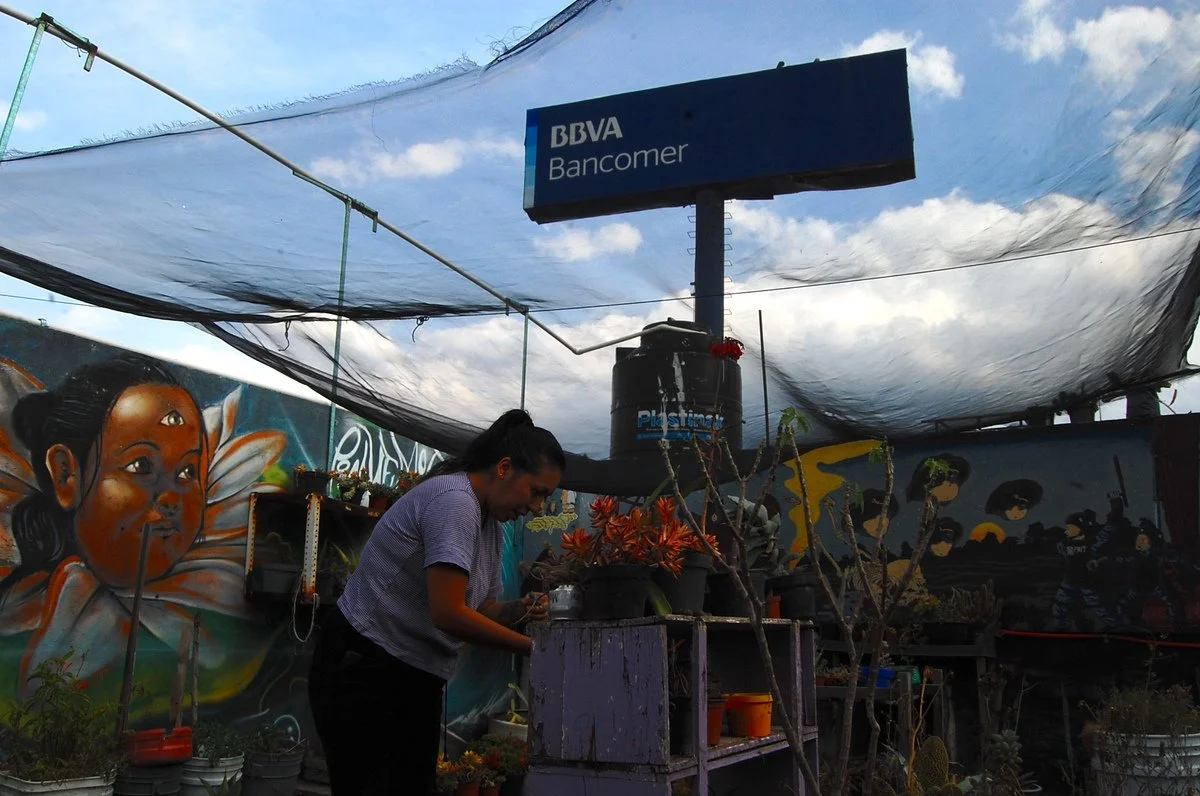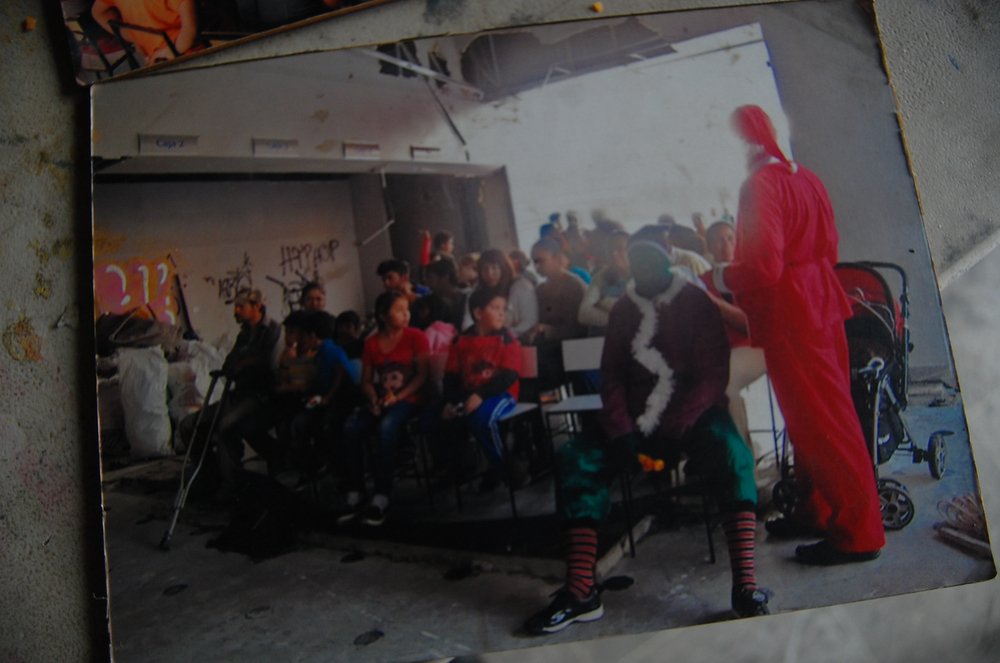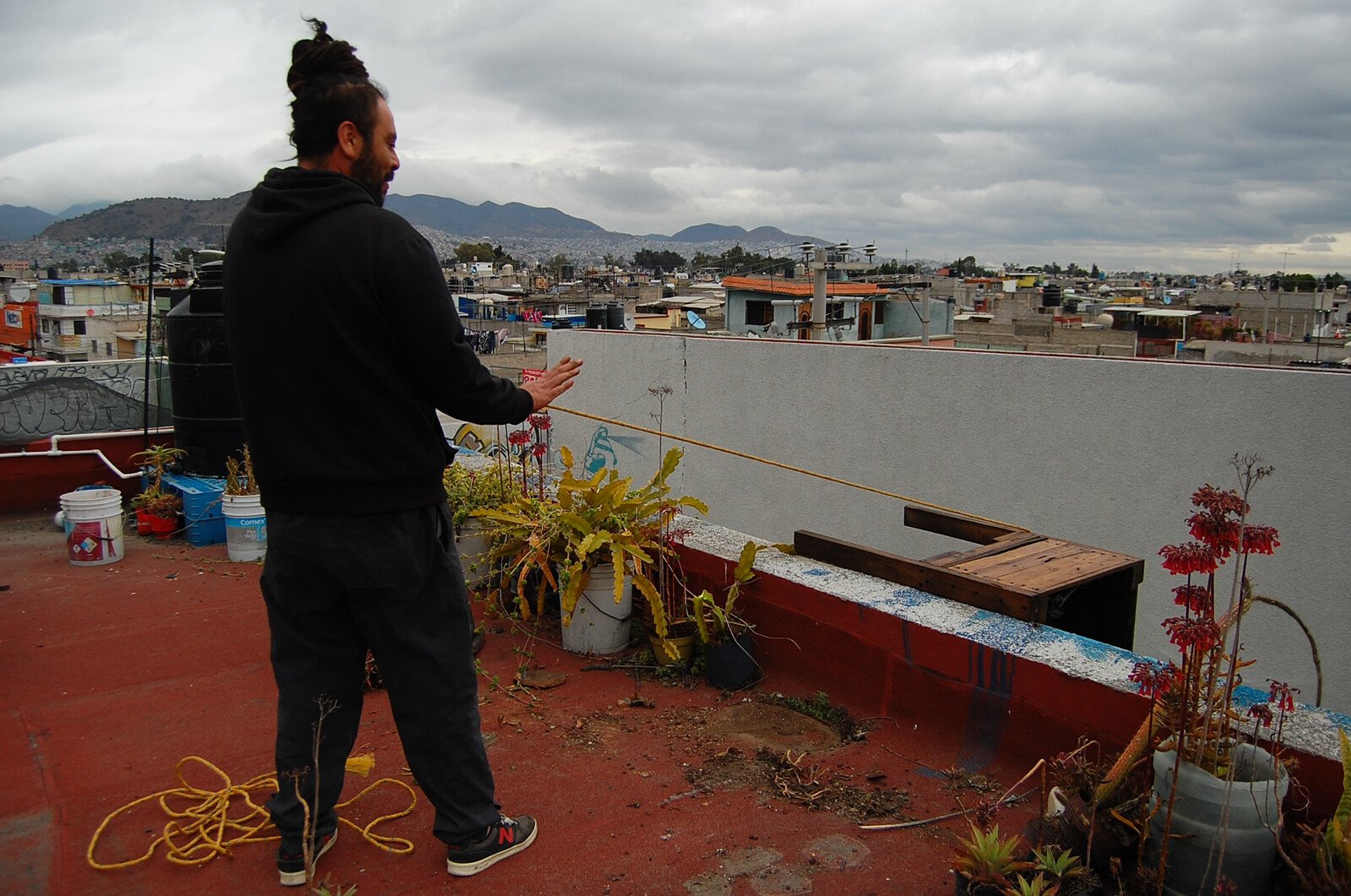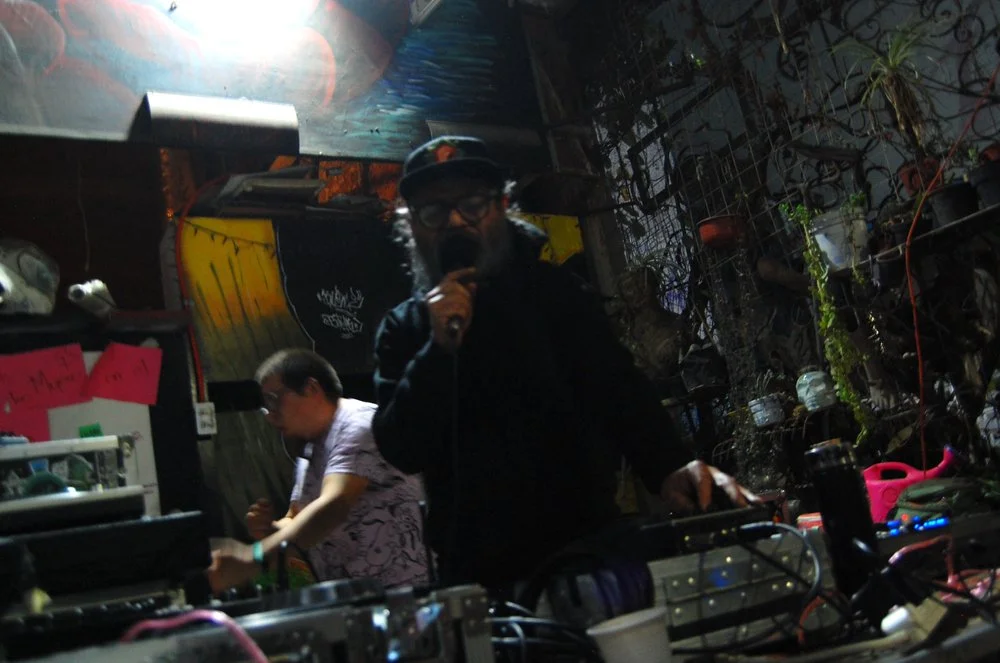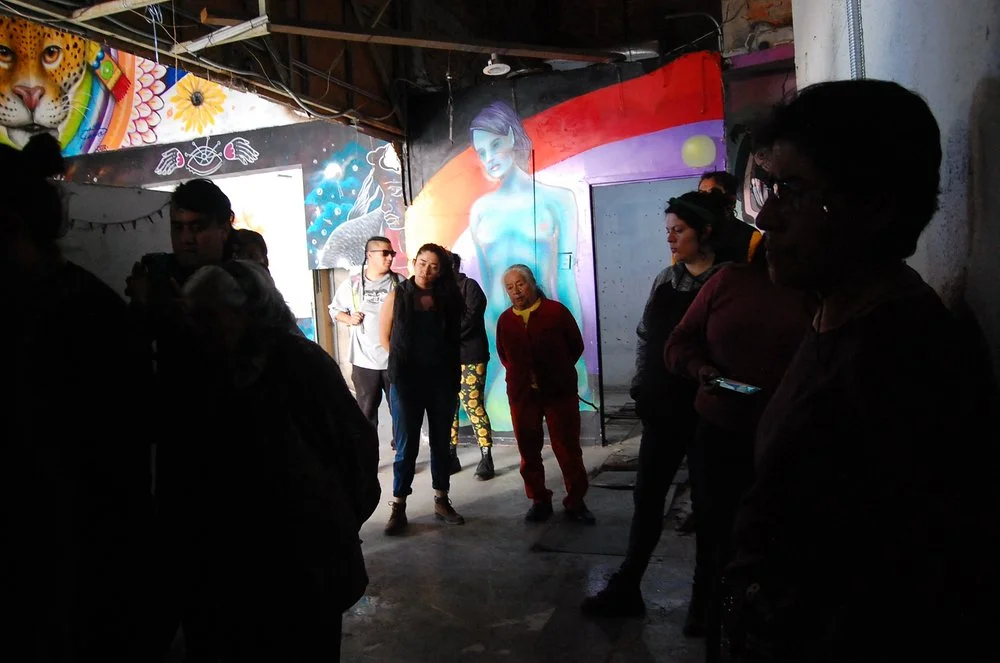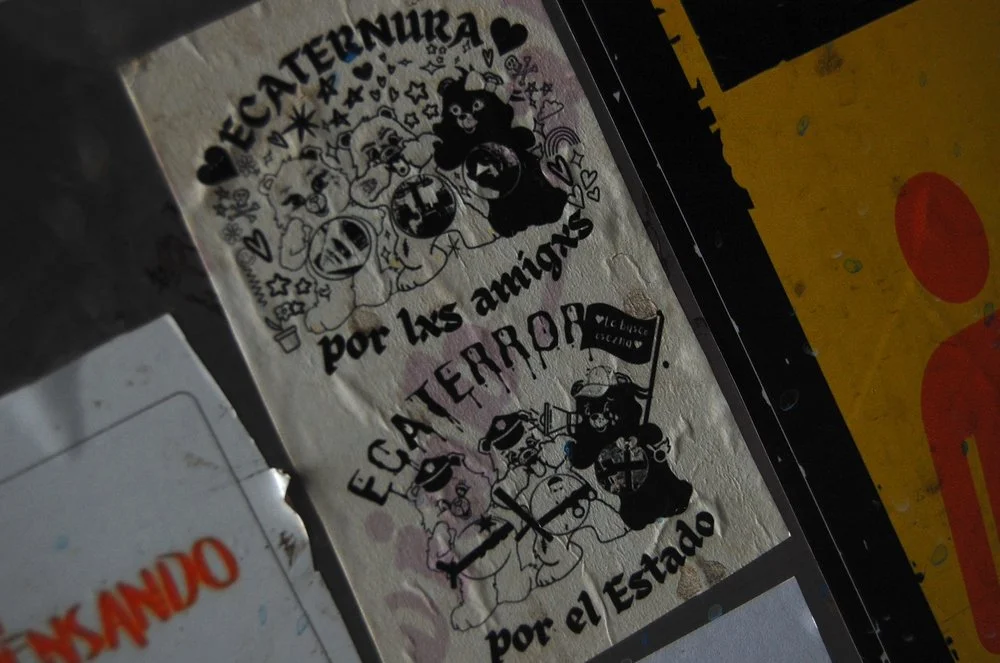How a global megabank squashed a cultural center in Ecatepec
The building filled with trash after BBVA abandoned it in 2013. Photo © Madeleine Wattenbarger.
Reportage · Madeleine Wattenbarger · January 12, 2023 · Leer en castellano • Originally published in Alboroto.
On the morning of Friday, December 8, Israel Ortiz González took a buzz saw to the hinges of two ornate metal gates. The doors served as the entrance to the B.A.N.C.O., a cultural center in the San Agustín neighborhood, in the Mexico City exurbs, inside a building that once held a BBVA Bancomer bank franchise. As Ortiz González cut through the rust, a dozen friends, neighbors and trash collectors filed past with boxes of books, paintings and plants. After a decade offering free cultural activities in the neighborhood, it was the last day of the B.A.N.C.O. Through a murky legal process, the financial institution demanded the building and evicted the B.A.N.C.O. collective.
The employees of BBVA Bancomer had abandoned the building without warning in 2013 after a series of robberies. The property became a dumping ground. The glass walls were broken; people left dead animals among the refuse. It filled with trash. Neighbors say that it became a hot spot for crime in the neighborhood.
Jaqueline Parasolar, an artist from San Agustín, Ecatepec, an exurb of Mexico City, waters plants on the roof of the B.A.N.C.O. cultural center. November 30, 2023. Photo © Madeleine Wattenbarger.
Among the first activities in the B.A.N.C.O. was an anti-Christmas pageant: a baby girl was born, and the Grinch made an appearance. Photo © Madeleine Wattenbarger.
Ortiz González and his friends, who had spent a few years organizing cultural activities as the collective Reventón Cultural, decided to clean up the space. They spent two weeks picking up trash. They filled five trash trucks, each one chipping in 500 pesos to cart it away.
They started to show movies every Thursday, from Disney to Buñuel. Neighbors of all ages came to the free screenings. Between events the trash kept piling up. The collective saved to put up gates and doors. Ortiz González had experience soldering, and he made the new walls out of scrap metal.
Israel Ortíz González, an artist from San Agustín, Ecatepec, stands in the doorway of the abandoned bank that, along with a group of friends, he turned into a cultural center. December 6, 2023. Photo © Madeleine Wattenbarger.
The friends made the space available to anyone who wanted to do a project. People from the neighborhood started to offer workshops and classes. Artists came from all over Mexico and beyond to paint murals. The collective gave the space a name: the acronym B.A.N.C.O., for “Nuestro Barrio Con Arte, Cultura Organizado,” meaning “our neighborhood with art, organized culture.”
“There was a moment when there were 40, 50 workshops,” Ortiz González recalled. “Whoever came joined in: ‘I want to teach a workshop, do it, I want to do this or that, do it.’”
Among the offering were herbal medicine courses, bike mechanic workshops and psychotherapy. The friends planted a garden. They gathered books for a library. They hosted gatherings for women in the community. Out front they placed a shopping cart dubbed the “gratiferia”: neighbors left old clothing for anyone to take. The collective rescued cats and dogs from the street, and with the help of a veterinarian, they started hosting monthly low-cost sterilizations for pets. Over five years, they neutered and spayed 2,000 animals. As a result, neighbors say, far fewer street dogs now roam the streets of San Agustín.
The members of the B.A.N.C.O. collective rescued cats and dogs and started a sterilization campaign. As a result, neighbors note that far fewer abandoned dogs roam the streets. December 6, 2023. Photo © Madeleine Wattenbarger.
Demands and threats
In October 2022, someone from BBVA Bancomer contacted Ortiz González. He invited the B.A.N.C.O. collective to a meeting in the bank’s Reforma headquarters. There, the financial institution made a proposal.
“They told us that they didn’t want the bad press that Bancomer is kicking out artists,” Ortiz González recalled. The BBVA representatives offered to donate them the space if the group officially constituted themselves as an organization.
Back in Ecatepec, the group debated the proposal. They decided to go ahead with it, and they started the legal paperwork.
But soon afterwards they started to receive threats. On December 16, 2022, a group of unknown people showed up at the B.A.N.C.O.
“They said that they were there to evict us, that they came from the bank, but they didn’t have any document that said that,” Ortiz González said.
In March the collective had a second meeting with Bancomer. The representatives told them that they could no longer donate the space. The issue, they said, was now in the hands of the bank’s legal team.
Early in the morning on April 26, 2023, a group of unidentified people again showed up to try to shut down the B.A.N.C.O. Ortiz González had spent the night in the space and was alone. The 22 people broke in and stole cameras, audio equipment, sculptures and tools. Neighbors came to support Ortiz González, and they managed to get the group to leave.
Ortiz González lowers a garden bed from the roof of the B.A.N.C.O. December 6, 2023. Photo © Madeleine Wattenbarger.
In June, an official from the Mexico State prosecutor’s office showed up at the B.A.N.C.O. He told Ortiz González that he had a hearing in a few days. That’s when Ortiz González found out that BBVA Bancomer had two legal cases against him, in both civil and penal court.
When he received the investigation file, Ortiz González saw that BBVA Bancomer had opened the cases in August 2022, two months before its offer to donate the building. He also saw that the declarations in the investigation file were false. Among them was the testimony of a police agent who claimed to have visited the B.A.N.C.O. on December 16, 2022. She alleged to have introduced herself to Ortiz González as a member of the Mexico State investigative police. But that exchange never happened. No agent from the police came that day: that was the day the strangers broke in.
After a series of hearings, the date of the trial was set for February 2024. The judge Ricardo Cárdenas Francisco considered Ortiz González a flight risk and placed a bond of 80,000 pesos to be paid on November 16, 2023. If he didn’t come up with the money, Ortiz González could be arrested. If sentenced, he would face seven years in prison.
The deadline to pay the bond passed. They didn't pay it. Ortiz González and the rest of the collective still hoped to find a way to stay in the B.A.N.C.O.
On Thursday, November 30, the teachers came to give their usual workshops. Among them was María Esther Gonzalez Díaz, who had been teaching herbalism and sewing classes at the B.A.N.C.O. for eight years.
She has lived in San Agustín for 50 years, and since the cultural center opened, she said, “there are more opportunities for people to learn.”
María Esther Gonzalez Díaz puts away the sign that advertised the herbal medicine classes she taught at the B.A.N.C.O. for eight years. December 7, 2023. Photo © Madeleine Wattenbarger.
If it were to shut down, “it will take jobs away from a lot of people.”
“Lots of teachers come to teach classes. Many come from far away because of their jobs. Looking for somewhere else where they let you [teach your class] means paying rent," Gonzalez Díaz said.
On December 2, friends of the B.A.N.C.O. came from all over the city to celebrate the space’s tenth anniversary. Among them was DJ Lupita la Cigarrita. A purple sound system towered over the dance floor where the partygoers danced cumbia and drank pulque.
The DJ Mexican Sound System accompanied the dancers at the B.A.N.C.O.'s tenth anniversary party. December 2, 2023. Photo © Madeleine Wattenbarger.
In a pause between songs, Ortiz González addressed the crowd. “All of us here are committing a crime by occupying this space,” he began.
Lupita grabbed the microphone.
“This isn’t okay, because this is culture,” she insisted. “We’re going to defend this place at all costs. No one, absolutely no one, will take this space from you.”
But even if they managed to pay the bond, the B.A.N.C.O. collective knew that the chance of winning a case against a company like BBVA Bancomer was little or nothing. The situation already had them living in constant tension. On Thursday, December 7, Ecatepec’s regional vice-prosecutor, Martín Marín Colín, met with Ortiz González and a legal representative from the bank. They agreed that BBVA would desist if Ortiz González turned over the building the next day.
The eviction
That Friday, two representatives from BBVA watched from the sidewalk as the friends and neighbors emptied the space. They didn’t think the bank would open another branch there. “They robbed them a lot,” one representative said. They didn’t know how the building would be used. “We’ll have to evaluate it.”
Photo © Madeleine Wattenbarger.
Friends and neighbors emptied out the building before turning it over to BBVA Bancomer. December 8, 2023. Photo © Madeleine Wattenbarger.
Plant and paintings piled up on the patio. The lawyers entered to examine the space. They took photos of the deteriorated drywall and the murals.
Friends and neighbors looked on as Ortiz González and the lawyers signed the paperwork. When they finished, an elderly woman approached one of the lawyers and tugged on his sleeve.
“Do you not like the community of San Agustín?” she asked.
“I don’t have the pleasure of knowing them,” he answered.
“You don’t have to know them. These agreements need to be made with the community, sir,” the woman said. “And thank him and lots of us who came to clean up the mess that you left behind.”
“Who is going to pay for the rapes that happened here? The crime that took place when there wasn’t anyone here, who will pay us for that?” a young man asked. “Corruption won, but we’re a community, not a space.”
“Take your bank,” another woman spat.
The friends applauded, grabbed the last few plants and left the building.
Friends and neighbors of the B.A.N.C.O. wait while Ortiz González and BBVA's lawyers sign the final paperwork. December 8, 2023. Photo © Madeleine Wattenbarger.
BBVA Bancomer's lawyer, and a man that members of the B.A.N.C.O. identified as the leader of a group that attempted to violently evict the cultural center, remained in the empty space. December 8, 2023. Photo © Madeleine Wattenbarger.
The lawyer stood in the entrance, now without doors. Beside him remained another man who the B.A.N.C.O. had seen before: he was the leader of the group that broke into the space on April 26.
The dogs looked back at the two men. The shopping cart filled with free clothes stood on the patio. Two neighbors stopped to comb through the discarded garments in front of the vacant building.
Photo © Madeleine Wattenbarger.
Photo © Madeleine Wattenbarger.



